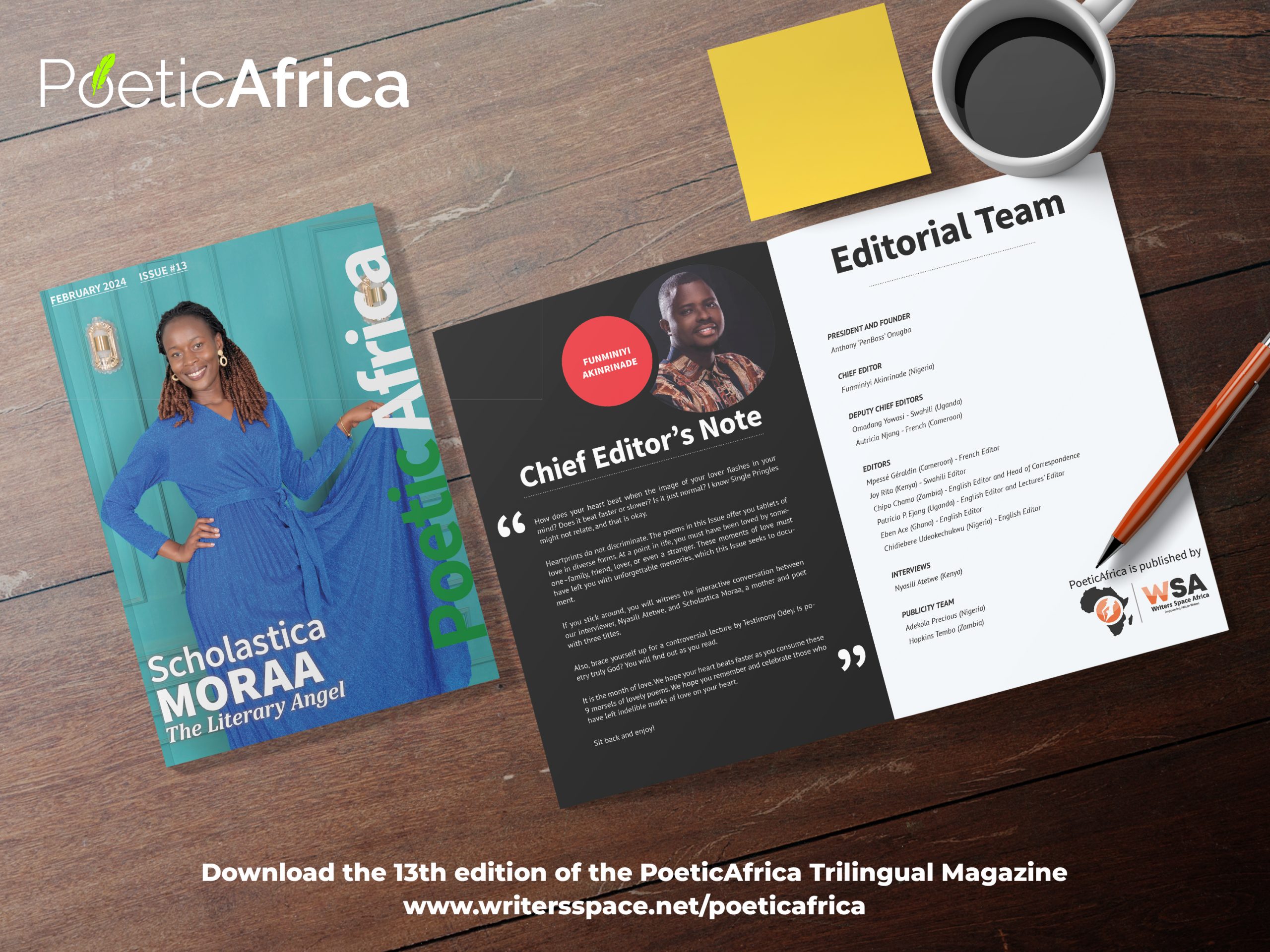This interview is By Nyasili Atetwe
—
Who is Scholastica Moraa? Do you have a pen name?
I am a mother. A poet with three titles. A short story writer. A lover of all things, most of all, literature. Although I am an Actuarial Science graduate pursuing a Masters in Business Administration, the reader and writer in me always come first. I always say that wherever I drift, the poet in me will always rise and a book will always be by my side.
Tell us about your journey into poetry? What inspired you to become a poet?
My journey and love story with poetry started back at my primary school. My English teacher, Mr. Japheth used to write and read poetry to us. It was so lyrical and beautiful and I fell in love with it. Unlike my peers who think poetry is difficult, I grew to know that poetry is simple, raw, beautiful, and tantalising to the mind. However, I never tried writing poetry until my last year in high school when I started penning down lyrical words and then over the years the words just keep finding me wherever I am. My journey started with that teacher who read poetry to a wide-eyed 11-year-old girl.
Could you share some insights into your favorite poetic techniques, forms, or styles that you like to experiment with in your work?
When I started writing poetry, I loved using rhythm. I guess this was inspired by the kind of poetry I came into contact with. However, with time I felt like this constricted me so much that I abandoned rhythm. I focus more on the emotion in the words and less on rhythm although I dabble in it once in a while. My favourite style is using imagery to enable the reader to see and feel what I am trying to communicate. Additionally, I am experimenting with sarcasm because I feel like it is not used enough.
Read – Interview with Liza Chuma Akunyili
What do you find most challenging or rewarding about being a poet? Are there moments or achievements in your career that stand out to you?
The most rewarding thing about being a poet is the ability to express things some people cannot express. When people read my work and relate to it, I feel like it is reward enough. Some readers cry after reading some of my poems and I think that is healing and therapeutic. Having some of my poems be that impactful is reward enough. The most rewarding thing about being a poet or writer for that matter is finances. My work does not pay me enough to stop studying and working. So I have to go to school, study, and work hard to pay my bills and also to pay for publishing because I self-publish. The moments in my writing journey that stand out to me are the books I have been able to give out to the world. The three collections with (a fourth on the way) are a testimony that beautiful things can come out of the heart even if some of the lines are painful to read.
Are there specific poets, writers, or literary traditions that have profoundly influenced your work? How have they impacted your writing style and themes?
Yeah there are. Poets such as Warsan Shire, Kristina Mahr, and Maya Angelou deeply resonate with me. These poets are emotional, unafraid, vulnerable, strong, and heartbreakingly beautiful. They are raw, unapologetic, and have the guts to say and do what most people are afraid to. These three women are so alike but still so different and it makes my heart ache when I read or listen to their work. By reading their work, I have learned that vulnerability is not a weakness and that being daring is the only way to live.
Which is your favorite among the poems you have so far written and why?
I do not think I have a favourite. My favourite poem depends on my mood. However, my poem ‘Expectations’ from Beautiful Mess stands the test of time. It always reminds me not to expect too much from people. They are human and are limited. By not expecting too much from the world I am able to let go of broken promises and the many times people did not measure up. The poem also encourages forgiveness, and I think we all need to be reminded of that.
Poetry is known for its concise and evocative language. What does it take to effectively distill complex emotions or ideas into a few lines or stanzas?
Practice. When I look at my work from when I started until now, I can say writing often has helped me to trap my emotions into a few lines effectively. For instance, what I could write in ten lines, I can now write in three and deliver the same message.
Read – Interview with Wangui Kimani
Emily Dickinson wrote, “To make a prairie it takes a clover and one bee, one clover, and a bee, And revery.” Do you have a poem inspired by seemingly small or ordinary things in your life?
Yes, I do. Not just one actually. But my poem ‘An Out of the Way Bus Stop’ from “This Heart of Mine” comes to mind. It talks about waiting for someone, probably a lover, at an out-of-the-way bus stop. It is likely that they may not come, but you still wait. Hopeful that they will show up because it is your only hope out of that place. Unfortunately, sometimes they never show up.
Many poets draw from their childhood experiences and memories. Are you one of them?
Not really. I draw inspiration from the things that happen in real life, although I also rely on memory to draw out emotions. For instance, I may want to write about being left behind, but it has not happened to me recently, so I draw a memory of how it felt to be left behind, and therefore, I am able to write about it.
Poetry can be a powerful medium for addressing social issues and advocating for change. In what ways, if any, does your poetry achieve these objectives?
Some of my poems address issues such as the greediness of politicians and cheating in relationships. My poem ‘The Politicians in Kalabaa’, which was featured in the Konch Magazine raises the issue of how leaders in most African countries bleed the citizens dry, and no matter how much they take, it is never enough. By using poetry in such ways, we can enlighten the community on more of these issues and bring about change. I am working on a collection dedicated to social issues and advocating for societal change.
Poetry can be deeply personal and may reveal intimate aspects of a poet’s life. Have you ever faced criticism or discomfort due to the transparency or vulnerability of your work, and how do you navigate such reactions?
Poetry is deeply personal, and I always tell people the only way to know a poet is to read what they write. When I first started writing, I was uncomfortable about it. However, this is who I am. I cannot change it, and I cannot stop writing. If by writing it out, I can help someone who cannot put in words what they feel, then it is worth it.
The relationship between poets and critics can be complex. What are your experiences with critical reviews and analyses of your poetry, and how they have influenced your work or perspective?
Like all writers, not everyone will love your work. As much as positive criticism helps me write more, I have learned not to be discouraged when encountering negative criticism. I have learned that even if a hundred people like your work, there are ten who will despise it. Somehow, the negative criticism hits harder. However, I am learning not to feel discouraged when I encounter it and to objectively look at their suggestions especially if they are constructive, and incorporate them into my work.
For many poets, publishing books or performing at events are key revenue streams. What is your take on this? How do such avenues contribute to your financial stability as a poet?
I have not explored performing at events. I fear my legs would turn to jelly, and I would embarrass all my ancestors. However, publishing books is a good avenue to earn revenue from your writing. Selling my books is a good income earner, and I believe it helps create awareness of your work as a poet.
Poetry prizes may lead to financial rewards, book deals, or publishing opportunities. Have you explored these opportunities, and to what end so far?
Not yet, but I hope to do so this year. I have been edging into poetry slowly, and I believe that in its own time, if it was meant to, it would happen.
Read – Interview with Nurka Slam (Nuru Kakore)
You have published poetry collections. I gather that that is a significant milestone for a poet. What was the process, in your case, of putting together the collection of poems and the themes or narratives that bind your published work together?
When I started, I was not focused on one theme or narrative. That is why my first collection, Beautiful Mess, is all over the place. However, Dreams and Demons, This Heart of Mine, and Sometimes Love Lives Here have specific themes. They are mostly about matters of the heart, the pains, and joys of love. As they say, mapenzi yanarun dunia (Love Runs the World).
You are not just an accomplished poet. You also do well in prose. What did winning the 2022 Kendeka Prize for African Literature mean to you? Has it deflected your focus from poetry?
Winning the Kendeka Prize for African Literature helped to put my name out there. I have met many amazing people in the literature world through that win. Apart from the financial aspect of that prize, the Kendeka win reaffirmed me as a writer. I used to doubt my abilities so much but winning that encouraged me to keep writing. I felt that I have potential to do more. Winning the prize has not deflected my attention from poetry because as I say, poetry will always find me no matter how far I run. It will always creep up on me even when I hide.
Collaboration with other artists and poets is a unique aspect of the creative process. Are there any collaborative projects or partnerships that have enriched your work?
I have collaborated with authors such as Anyango Nyar Aketch, Winnie Madoro, and Emily K Millern in ‘Dreams and Demons’; Betty Kilonzo in ‘This Heart of Mine’ and Anyango Nyar Aketch in ‘Sometimes Love Lives Here’. I believe blending these amazing poets’ work with mine has helped enrich my work and bring it to a wider audience. Working with these poets has educated me a lot and I look forward to more of these collaborations. There is always something new to learn, and when we come together, it is always bigger and better.









Insightful interview, I must say.
My takeaway: practice to be better.